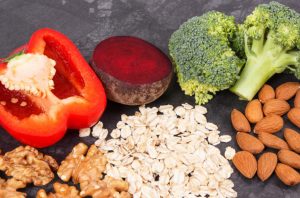
In the spring, many citizens habitually complain of feeling unwell: rapid fatigue, drowsiness, lethargy, deterioration of working capacity, decreased immunity (and as a result — colds, exacerbation of chronic diseases, other health problems).
Most people treat this as an inevitability, writing off their condition as a mysterious “spring vitamin deficiency”. Let’s figure out what kind of attack this is, and what to do to feel good at any time of the year.
Is any vitamin deficiency-beriberi?
In fact, what we used to call vitamin deficiency in everyday life is not such, and this is good news. Because beriberi is a condition in which a vitamin (one or more) is almost completely absent in the body. In order to bring yourself to this, a modern person who does not have severe diseases of the gastrointestinal tract, you need to diligently mock yourself-for example, through starvation diets.

It is difficult not to notice beriberi, because a person’s well-being is seriously deteriorating. At the same time, specific symptoms appear that are characteristic of a particular type of severe vitamin deficiency.
So, for sure, everyone has heard or read about scurvy — a disease of seafarers who were torn away from land for a long time and did not have the opportunity to eat fresh vegetables and fruits (although not only sailors, of course, were ill with scurvy). As a result, vitamin C deficiency occurred in the body, manifested by symptoms such as bleeding gums, loosening and loss of teeth, hemorrhages (subcutaneous, in severe cases — internal), dry skin, pallor, cyanosis of the lips, nails, general weakness. This is beriberi.
A less well — known disease in European countries – beriberi – is associated with a deficiency of vitamin B1 (thiamine). It is manifested by deterioration of brain functions, coordination disorders, difficulties when walking (in severe cases, paralysis develops), muscle weakness, impaired sensitivity of the extremities (possibly both lack of sensitivity and hypersensitivity, burning sensation), edema, digestive problems (constipation, loss of appetite), acute heart failure. And this is also beriberi.
Modern people are more often faced with hypovitaminosis — a mild form of vitamin deficiency caused by a decrease (in comparison with the normal need) of the content of one or more vitamins in the body.

Its danger is that the signs of hypovitaminosis sometimes have every chance to go unnoticed, because they are easily attributed to other reasons — for example, stress or fatigue. Usually these are non-specific symptoms that are not as pronounced as the manifestations of beriberi, so it is not easy to determine which vitamin deficiency they indicate.
Why is there a vitamin deficiency?
It would seem that, unlike the ancient navigators, we have all the opportunities to prevent vitamin deficiency. However, the problem is still relevant. Why? What causes lead to the occurrence of vitamin deficiency in the body?
1. Unbalanced nutrition
The body receives the necessary vitamins from food. And different types of food products provide our need for various vitamins. Therefore, it is so important that the diet is diverse — any bias (for example, refusal of certain products) can lead to a deficiency of any substance necessary for the body, including vitamins. Think about this when you are going to sit on the next “fashionable” diet.

The quality of the food consumed also plays a role. Thus, whole-grain products significantly exceed refined ones in terms of the amount of vitamin B1, meanwhile, refined cereals, flour and products made from them predominate in the diet of most of us.
Improper storage or preparation also leads to a decrease in the content of vitamins in food products or their insufficient absorption by the body. For example, vitamin C is quickly destroyed during storage of vegetables and fruits and their heat treatment; when soaking peeled and chopped vegetables, the content of vitamin C in them also decreases, since it is well soluble in water.
2. Increased body’s need for vitamins
The daily norms of vitamin intake vary depending on certain factors: age, gender, health status, etc., so you can not focus on some “average” figures. If you adhere to norms that do not take into account your individual characteristics, there is a high probability that your body receives less vitamins than it needs.

The need for vitamins increases with severe stress, intense stress (both physical and mental), with acute and chronic diseases, injuries, as well as during the recovery of the body after the disease. Women need more vitamins than usual during pregnancy and lactation. In children and adolescents at different periods of growth and development, in the elderly (especially women during menopause), the need for certain groups of vitamins changes. All this must be taken into account when making up your diet.
We should also mention the influence of climatic conditions, since they are largely responsible for our spring problems. A cold climate (however, as well as a hot one) requires an increased (up to 30-60% of the average norm) intake of vitamins. But if the consumption of meat, dairy products, cereals does not depend on the season, then we usually eat less vegetables and fruits in winter than in summer, and the content of vitamin C in them significantly decreases during storage — here are the prerequisites for the development of hypovitaminosis.




Leave a Reply